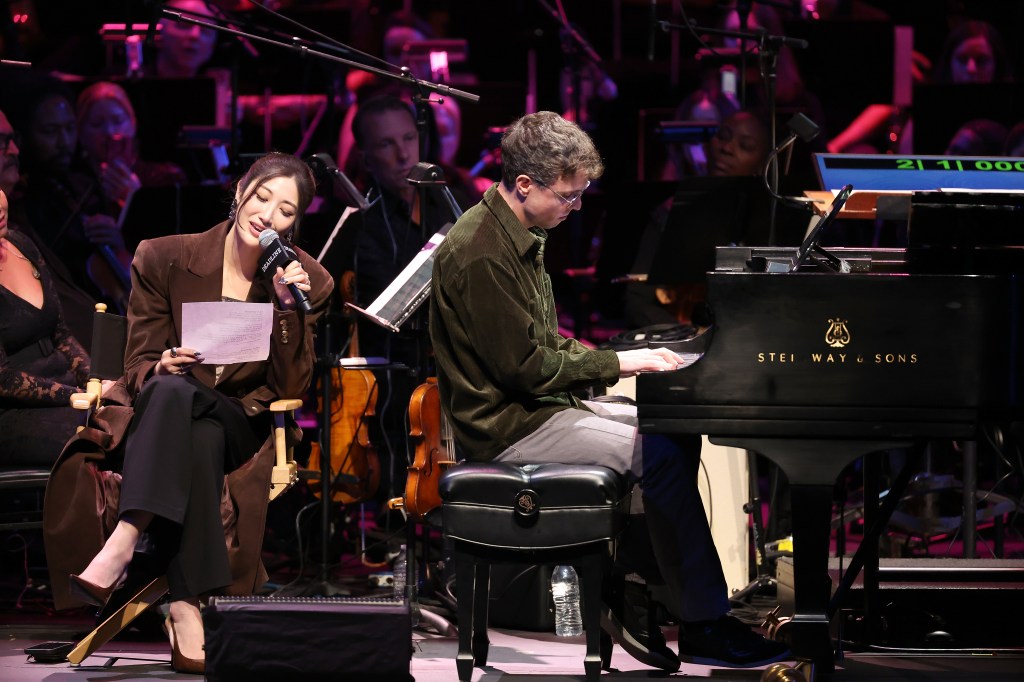Many layers went into the process of creating “Golden,” the breakout anthem from Netflix’s most-watched film ever, KPop Demon Hunters.
At Deadline’s Sound & Screen: Film event, singer-songwriter EJAE, who sings the vocals for the film’s main character Rumi (voiced by Arden Cho), unpacked the creation process with co-writer Mark Sonnenblick. Since its debut on the streamer in June, the film has netted 325 million global views, with its soundtrack racking up 8.3 billion streams.
“Every line and every 10 seconds of the song has to do something different because it’s a move. It has to be on story and figuring out. I mean, this was the seventh song that was written for this slot,” Sonnenblick explained. “Part of what really clicked with this version of it, aside from this amazing track and its iconic dentist melody, everyone had the best sense of what exactly needed to happen storywise. It’s a song about them.”
EJAE first came up with the melody on the way to the dentist, and she played the original voice memo for the audience at UCLA’s Royce Hall. “Golden” has amassed 952 million streams on Spotify.
“The track had this bittersweet sound to it that instantly required me to create a melody, but when I was making the melody, it was always with the intention of what the directors wanted in that scene,” she said. “Maggie [Kang] really did want a scale going up melodically and also being really hard. She said, ‘I want a high note the main character can almost hit.’ That was all intentional.”
The pair demonstrated an early draft of the song with longer, more theatrical lyrics that were edited down for the final version. Part of the revision process involved taking into consideration the imagery in the film while the song played to infer how much audiences would interpret from that in conjunction with the lyrics. Certain details in the animation allowed EJAE and Sonnenblick to simplify some lyrics. For example, “covered in the poison that’s inked on my skin” was an early line that was simplified because Rumi visibly demonstrates this image by taking off a robe to show her shoulders.
“The first four lines are Rumi’s anxiety about inheriting this role from her mother who was also a hunter. Then you see in the animation, you have Zoey’s backstory with two lives. That’s literally because she’s pulled between two cultures and two homes. And then you have two lines about Mira,” Sonnenblick added. “But really dialing in. ‘Okay, what is the story you need to hear about these characters in that moment?’ And then, in a cool way, you get to the bridge, where you’re in a pop song, the literal pop song they’re releasing. The bridge is Rumi alone, singing her feelings like a musical that is not diegetic. You have the song in universe that then the bridge is actually her, singing something that is not a part of the song.”
EJAE compared the combination of watching the film and hearing the song versus just listening to the song, emphasizing that the movie’s story gives the song that much more meaning.
“The concept of duality is so layered in the whole film. The song in general, if you just hear it as a pop song and you haven’t seen the film, it’s a great pop song,” she said. “But if you watch the film, it has a completely different meaning. In the bridge, again, you see the depth of the song and the lyric and what the song really means when you watch the film.”
A sequel film is being eyed for 2029, but EJAE and Sonnenblick remained tight-lipped when asked if they had any upcoming dentist appointments.
Check back Monday for the panel video.

